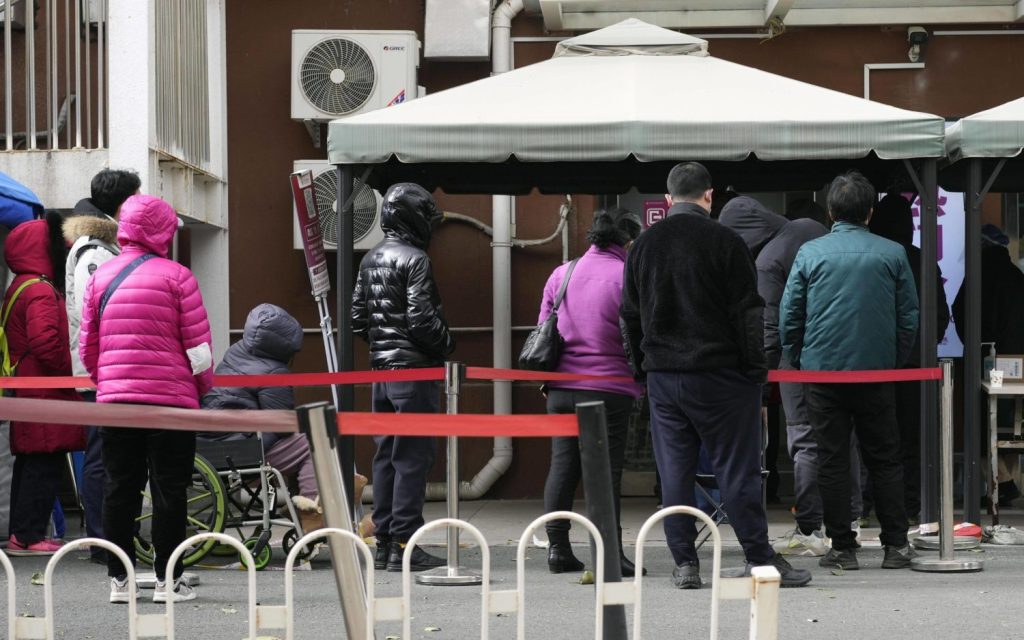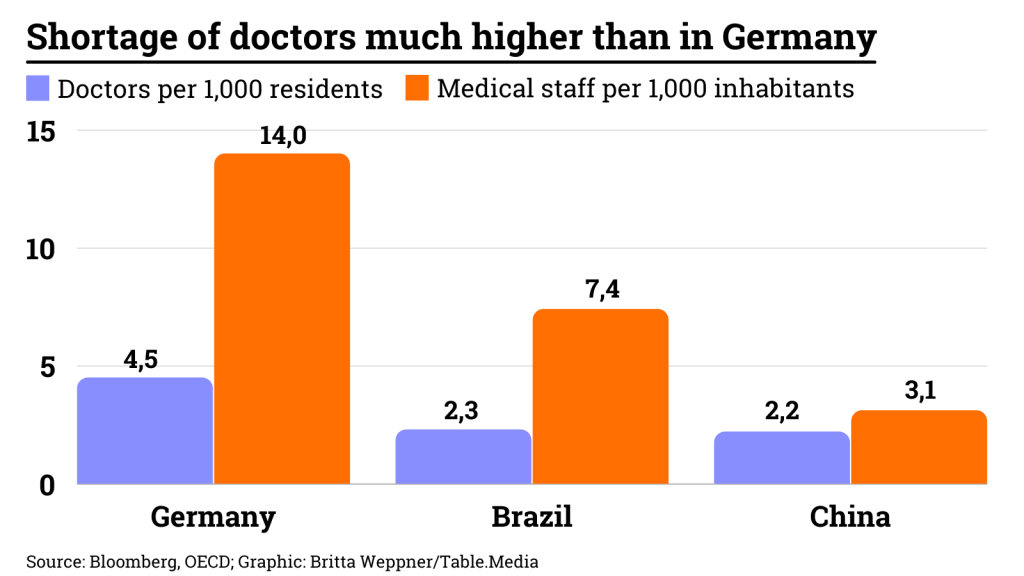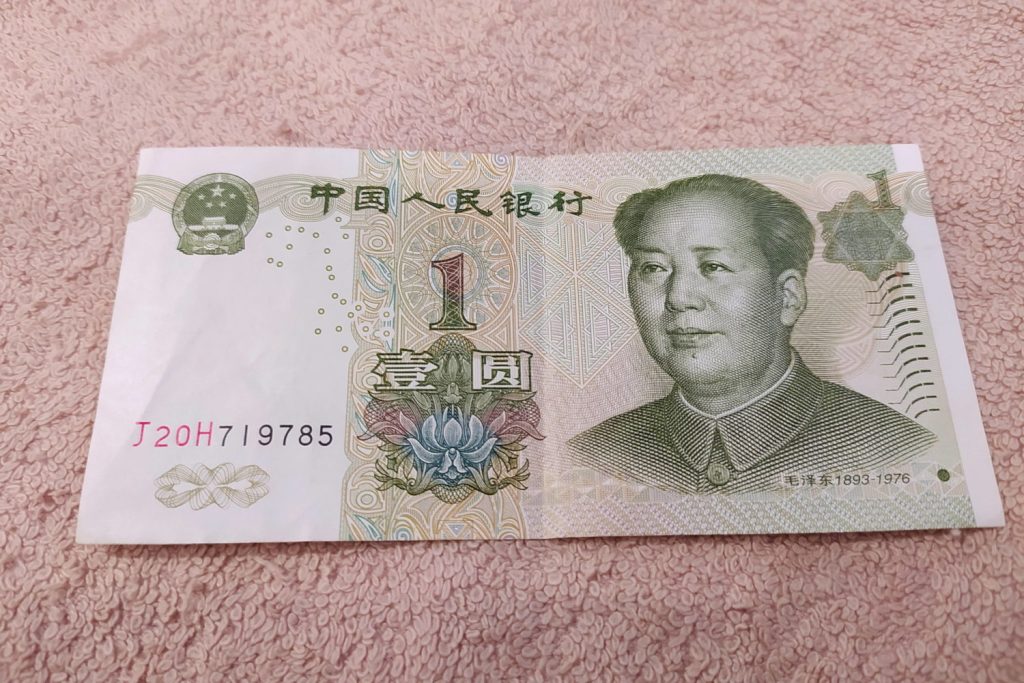After the sudden end of zero-Covid, China’s authorities now look for ways to at least appear to be responding to the Omicron wave. Hastily erected fever clinics, for example, are supposed to help shorten the waiting lines outside existing treatment centers.
However, when it comes to breaking the infection chains, the authorities have given up. But the true magnitude of the situation is impossible to assess. This is because the authorities no longer publish any infection numbers, as Finn Mayer-Kuckuk reports.
Will the country now descend into Covid chaos after the extreme zero-Covid policy? Images of overwhelmed clinics at least suggest as much. And the upcoming New Year in the second half of January could make the situation even worse.
In the first year of the pandemic, Beijing presented itself as a pioneer and showed its generosity, for example by donating masks. Serbia, for example, received aid from the People’s Republic – the EU, on the other hand, had little presence in the country in the Western Balkans at the time. For Beijing, this was an enormous image boost, explains Stefan Vladisavljev at the Table.Live briefing on China’s influence in Central and Eastern Europe. My colleague Michael Radunski recapped the event for you.

– Ad –
Place your job ad in the China leading medium. With over 10,000 recipients every working day, China.Table is the large, up-to-date forum for the China scene. Book at the introductory price: Depending on the format, an ad costs 400 euros (80 characters), 1250 euros (350 characters) or 2400 euros (700 characters) plus VAT. Send us an e-mail and in three days your job offer will be widely known: advertising@table.media

China’s state apparatus responds to the alarming rise in the number of new Covid infections with a variety of instructions. However, the goal is no longer to break the chains of infection, as it was during zero-Covid times. The new measures now only try to cope with the high number of infected people. The government thus surrenders to the spread of the Omicron variant. Meanwhile, the situation becomes increasingly unclear as the authorities release fewer data.
The National Health Commission speaks of a “rapid increase in demand for diagnosis and treatment” of the disease. As a result, the government has already set up 47,000 new Covid treatment centers at hospitals nationwide. These so-called fever clinics already treated Covid patients in the past. They are usually located at larger institutions. In the future, they will also be set up at smaller community hospitals.
Treatments at fever clinics have been streamlined, with only 40 minutes available per patient. The Health Commission also ordered the expansion of online doctor consultations, which are to be accessible 24 hours a day. Patients with mild symptoms should ideally no longer see a doctor at all and recover at home.
In parallel, Beijing stopped publishing Covid infection numbers. It would be “pointless to statistically record asymptomatic patients if no one participates in PCR testing anymore,” the National Health Commission announced. However, there were also no new figures Wednesday on severely ill patients or deaths.

Recent official figures appeared increasingly unrealistic (China.Table reported). While Beijing residents consistently observe a high number of Covid cases in their social circles, the nationwide numbers have recently declined. After 40,000 cases in November, the latest figure was just over 2,000. At the same time, there are reports of 20,000 patients seeking help from fever clinics in Beijing alone.
The Japanese newspaper Nikkei reported that hospitals have to turn away regular patients due to overcapacity. The situation is further complicated by a large number of sick medical personnel, the report said. A 23-year-old medical student in Sichuan collapsed after his shift at the hospital and died shortly after. It appears the vaccination rate is even low amongst hospital staff.
Back in the spring, poor preparation for such a situation was already discussed in the debate on how to get out of zero-Covid. Experts are now looking with double concern at poorly equipped hospital wards in villages and small towns. The big cities are better equipped, but even there the number of beds and staff per capita is much lower than in Europe. This was also one argument for zero-Covid.

Essential medication is becoming scarcer and scarcer in the meantime, as the Health Commission admitted in a press conference. Ibuprofen and paracetamol are already being rationed, and shelves in many pharmacies are empty. This does not bode well for the supply of antipyretics for other countries: Many precursors come from China. Meanwhile, the country wants larger quantities of the Covid drug Paxlovid by the US company Pfizer, as the importer China Meheco announced on Wednesday.
The upcoming Spring Festival (Chinese New Year) on January 23 could result in a strong nationwide spread of the virus, carrying it from the cities to the surrounding countryside. Since restrictions have fallen, many people want to visit their families as usual. Citizens have already booked many trains and airline tickets.
Worries about the Omicron wave are currently growing at the top. Reuters reported that the meeting of the Communist Party’s Economic Work Conference has been postponed due to the infection wave. This conference, chaired by Xi Jinping, sets the course for economic planning. In light of weak economic growth, it is considered particularly important this time.
The enthusiasm for China’s alliances in Central and Eastern Europe has faded. Hopes were high when China launched the 16+1 alliance in 2012. Beijing wanted to work more directly and closely with 16 states in the region. When another state, Greece, joined in 2019, it seemed as if 17+1 could split the EU at its edges. But ten years after its inception, the format faces termination, experts from Prague, Budapest and Belgrade concluded at Wednesday’s Table.Live briefing.
Ivana Karásková (China expert and founder of CHOICE in Prague), Tamás Matura (researcher at Corvinus University Budapest) and Stefan Vladisavljev (Director of the Belgrade Security Program) discussed China’s influence and prestige in Central and Eastern Europe.
By now, disappointment about China’s commitment dominates, the Czech expert on China notes. “When China came to the region in 2012, there were huge expectations. But almost none of it has materialized, except for maybe a few projects in the Western Balkans,” Karásková says. “China didn’t deliver in its cooperation with Central and Eastern Europe – either because it couldn’t or because it didn’t want to.”
As a result, Lithuania became the first country to withdraw from the format in February 2021 (China.Table reported). According to Lithuania’s Foreign Minister Gabrielius Landsbergis, cooperation with China had brought “almost no benefits”. In August of this year, Estonia and Latvia turned their backs on the dialogue forum. Above all, China’s position and closeness to Russia in the Ukraine war had caused great estrangement in many Central and Eastern European countries.
And so Karaskova predicts that the alliance will continue to shrink: The Czech Republic will leave the 14+1 format next year. “That will be a big bang and could be a signal for other countries.” With Lithuania’s departure, a domino effect has set in that will slowly spread to other countries.
Tamás Matura cautiously disagrees. Although the scientist at Corvinus University in Budapest also recognizes a certain domino effect, some stones do not necessarily have to fall over as well. “Hungary will not turn away from China, it will not become the next Lithuania.” Although the initial euphoria has faded somewhat in Budapest as well and a great deal of dissatisfaction can also be detected in Warsaw, many projects continue in the background. “In any case, Victor Orbán will not change his pro-China stance.”
During the discussion, Stefan Vladisavljev, Director of the Belgrade Security Program, pointed out Serbia’s unique status as a non-EU member. This puts Belgrade in a slightly different position: 14+1 is not crucial for Serbia’s relations with China. Belgrade will step up its ties with China.
After all, “China invests more money in Serbia than any single EU country, including more than Germany. And cooperation will continue to increase, including in areas such as police and defense,” explains Vladisavljev. In many places, however, he feels that there is a lack of critical discussion about China’s involvement, for example in topics such as climate action.
This makes it clear that even the format, which has shrunk to 14+1, is no longer a purely economic venture. This is most evident from the repeated vetoes by Hungary and Greece on several EU declarations concerning China. And in Belgrade, too, a similarly close connection to Beijing emerges. “China is now as popular in Serbia as Russia. The government praises Beijing’s cooperation and support at every opportunity,” Vladisavljev explains.
In principle, the European Union should be the natural partner of the Balkans. “But the EU simply doesn’t help Serbia enough during crises like the Covid pandemic. So it is easy to present China as a better alternative.” He believes Brussels has done little so far to counter China’s growing influence in Serbia.
But that is set to change: The EU wants to counter China’s multi-billion dollar Belt and Road Initiative (BRI) with Global Gateway and present itself as a global geopolitical player (China.Table reported). On Sunday evening, a panel chaired by EU Commission President Ursula von der Leyen met for the first time to review the strategy (China.Table reported).
This is also noticeable in Central and Eastern Europe. At present, the Czech Republic is not interested in Global Gateway because nothing works so far, says Karásková. “But it’s good that there is finally a European alternative to China’s Belt and Road initiative.” Matura argues. “The EU has so far failed to occupy the agenda. China’s Belt-and-Road Initiative has big problems. Beijing would take advantage of such an opportunity. But the EU is not doing that.”
One thing became clear during the discussion: China’s BRI initiative and the 14+1 format have severe problems. The high expectations have not been met so far. The situation in Central and Eastern Europe offers a chance for the EU to take advantage of China’s failings.
After the violent incident at the Chinese consulate in Manchester, six Chinese diplomats have left the United Kingdom, including the Consul General. The government in Beijing arranged for the diplomats to leave, British Foreign Secretary James Cleverly announced.
The police in Manchester actually wanted to have the diplomats’ immunity lifted to question them about the violent incident in October – and set an ultimatum until Wednesday. As a result, they evaded the British judiciary by leaving the country.
During a pro-democracy protest in October, an activist had been dragged onto the Chinese consulate grounds and physically assaulted (China.Table reported). Subsequently, London’s Foreign Secretary summoned the deputy of the Chinese ambassador, who was out of the country at the time. flee
The Chinese government denies operating “police service stations” in other countries. However, it admitted the existence of so-called “service stations” for its own citizens abroad. As a spokesman for the Foreign Ministry stated in a letter, “passionate overseas Chinese groups” would use them to help fellow countrymen in official matters. The letter was obtained by dpa news agency. Security authorities in Germany and other countries, on the other hand, assume that such institutions also serve to prosecute regime critics.
The letter, by contrast, depicts the activities as harmless. The service centers were intended to help Chinese citizens who could not travel home during Covid-19. This involved medical examinations, driver’s license applications and the like. The volunteers are “committed to the Chinese diaspora and not Chinese police officers,” the letter said. China would not interfere in internal affairs and respected the legal sovereignty of other countries. These “service stations” would not violate local laws and “do not pursue any criminal activities.”
According to investigations by the Madrid-based human rights organization Safeguard Defenders, some 100 “centers of Chinese overseas police” are believed to exist in more than 50 countries (China.Table reported). flee
Japan is expected to present a revised version of its national defense strategy later this month – abandoning its last pacifist principles for good. The parties in the ruling coalition have already agreed in early December to grant the country the ability to launch a massive counterstrike in the event of an attack. The wording, however, is misleading. The idea, for example, is to attack enemy missile bases even before they have launched a strike. This is why the paradoxical term “preemptive counterstrike” is circulating.
The current version of Japan’s defense strategy dates back to 2013. It was already considered at the time to be a break with the basic peaceful stance, which has had constitutional status since the Second World War. Arms spending is currently increasing from one to two percent of economic output. One focus is on missile defense against China and North Korea. To this end, Japan plans to deploy ten newly developed missile types (China.Table reported). Like Germany, Japan is also working on a national security strategy. fin
The European Union has held its first joint summit with the heads of state and government of the Association of Southeast Asian Nations (ASEAN). The two organizations agreed on a joint final declaration on Wednesday, which emphasizes closer economic cooperation. The EU relies on ASEAN nations such as Vietnam and Indonesia, not least to make its supply chains less dependent on China. Brussels also wants the ASEAN states to take a foreign policy stance against China and Beijing’s positions, but with less success. An overview:

The German Supply Chain Due Diligence Act will come into force on January 01, 2023 – a milestone for strengthening and protecting human rights and environmental standards along global supply chains. At the same time, negotiations for an EU-wide supply chain regulation – the Corporate Sustainability Due Diligence Directive – are in full swing. This means corporate due diligence obligations will finally become binding – a long overdue measure.
However, in the current debate surrounding the legal regulations, the focus is primarily on the potential challenges for German and European companies. What is often overlooked is what the developments are really about: Improving living conditions along global supply chains and strengthening the rights of those affected. We must live up to this commitment – with the German Supply Chain Due Diligence Act, as well as with regard to the planned EU Supply Chain Law.
Because the grievances in the global value chains with over 450 million employees are huge. Many of the products and raw materials for the German and European markets are produced or extracted under intolerable environmental and working conditions, for starvation wages or even with the help of exploitative child labor. According to the latest figures from the International Labor Organization (ILO), 27.6 million people worldwide work under forced labor, including more than 3.3 million children.
Vulnerable and marginalized groups in particular, like women and girls, often experience multiple discrimination and gender-based forms of violence in all sectors – be it as seamstresses in textile factories, farmers in the fields, or in the service sector. The COVID-19 pandemic further exacerbated this gender-based inequality.
The negative impact on the environment is also enormous: Textile production, for example, uses 43 million tons of chemicals per year. Factories release these directly into surrounding waters via their wastewater, endangering the health of people in neighboring communities in the process. The textile sector also accounts for more than a third of the microplastics in the world’s oceans.
However, human rights violations and environmental damage do not only occur in faraway places, but also in Europe, for example in the form of exploitation of migrant workers in German slaughterhouses.
All these examples make it clear: Corporate due diligence laws must be effective above all where human and environmental violations occur. But how do we achieve this desired efficacy – especially in view of the EU directive?
For what is really at stake – better working and living conditions along global value chains – we need government and corporate commitment as well as clear and effective legal frameworks. Of course, this cannot be done without the necessary support. That is why the BMZ currently expands existing national offers for companies and civil society to the EU level. Because one thing is certain: We will only achieve effectiveness if private and voluntary instruments, on the one hand, and government and binding instruments, on the other, interlock – in the interests of those affected in our value chains.
Baerbel Kofler is a trained banking specialist, computer scientist, Ph.D. linguist, and member of the Social Democratic Party (SPD). She has been a member of the German Bundestag since 2004. From 2016 to 2021, she served as the Federal Government Commissioner for Human Rights Policy and Humanitarian Assistance at Germany’s Federal Foreign Office. Since the beginning of the governing “traffic light coalition”, she has been Parliamentary State Secretary in the Federal Ministry of Economic Cooperation and Development.
Stefan Hein returned to Germany from Beijing to work for the German Society for International Cooperation (GIZ). Hein was Head of Finance and Administration in China until spring of this year. After a break, he has been Senior Compliance Manager at GIZ in Eschborn since November.
Christian Staerz, previously GIZ Director in Beijing, is also back in Germany after around five years. Staerz is now Technical Planner at GIZ in Frankfurt.
Is something changing in your organization? Why not let us know at heads@table.media!

What is special about this picture of a one yuan note? It was taken yesterday in Saint Petersburg. Ten years ago, hardly anyone wanted the yuan: It could not be easily exchanged for euros or US dollars. And people did not really want to keep it for future visits to China. The banknotes were often badly crumpled and dirty. That has changed. In Russia, the Chinese People’s Currency is currently in high demand, because it is considered much more stable than the ruble. This means that China’s announced renminbi internationalization is working – albeit differently than planned.
After the sudden end of zero-Covid, China’s authorities now look for ways to at least appear to be responding to the Omicron wave. Hastily erected fever clinics, for example, are supposed to help shorten the waiting lines outside existing treatment centers.
However, when it comes to breaking the infection chains, the authorities have given up. But the true magnitude of the situation is impossible to assess. This is because the authorities no longer publish any infection numbers, as Finn Mayer-Kuckuk reports.
Will the country now descend into Covid chaos after the extreme zero-Covid policy? Images of overwhelmed clinics at least suggest as much. And the upcoming New Year in the second half of January could make the situation even worse.
In the first year of the pandemic, Beijing presented itself as a pioneer and showed its generosity, for example by donating masks. Serbia, for example, received aid from the People’s Republic – the EU, on the other hand, had little presence in the country in the Western Balkans at the time. For Beijing, this was an enormous image boost, explains Stefan Vladisavljev at the Table.Live briefing on China’s influence in Central and Eastern Europe. My colleague Michael Radunski recapped the event for you.

– Ad –
Place your job ad in the China leading medium. With over 10,000 recipients every working day, China.Table is the large, up-to-date forum for the China scene. Book at the introductory price: Depending on the format, an ad costs 400 euros (80 characters), 1250 euros (350 characters) or 2400 euros (700 characters) plus VAT. Send us an e-mail and in three days your job offer will be widely known: advertising@table.media

China’s state apparatus responds to the alarming rise in the number of new Covid infections with a variety of instructions. However, the goal is no longer to break the chains of infection, as it was during zero-Covid times. The new measures now only try to cope with the high number of infected people. The government thus surrenders to the spread of the Omicron variant. Meanwhile, the situation becomes increasingly unclear as the authorities release fewer data.
The National Health Commission speaks of a “rapid increase in demand for diagnosis and treatment” of the disease. As a result, the government has already set up 47,000 new Covid treatment centers at hospitals nationwide. These so-called fever clinics already treated Covid patients in the past. They are usually located at larger institutions. In the future, they will also be set up at smaller community hospitals.
Treatments at fever clinics have been streamlined, with only 40 minutes available per patient. The Health Commission also ordered the expansion of online doctor consultations, which are to be accessible 24 hours a day. Patients with mild symptoms should ideally no longer see a doctor at all and recover at home.
In parallel, Beijing stopped publishing Covid infection numbers. It would be “pointless to statistically record asymptomatic patients if no one participates in PCR testing anymore,” the National Health Commission announced. However, there were also no new figures Wednesday on severely ill patients or deaths.

Recent official figures appeared increasingly unrealistic (China.Table reported). While Beijing residents consistently observe a high number of Covid cases in their social circles, the nationwide numbers have recently declined. After 40,000 cases in November, the latest figure was just over 2,000. At the same time, there are reports of 20,000 patients seeking help from fever clinics in Beijing alone.
The Japanese newspaper Nikkei reported that hospitals have to turn away regular patients due to overcapacity. The situation is further complicated by a large number of sick medical personnel, the report said. A 23-year-old medical student in Sichuan collapsed after his shift at the hospital and died shortly after. It appears the vaccination rate is even low amongst hospital staff.
Back in the spring, poor preparation for such a situation was already discussed in the debate on how to get out of zero-Covid. Experts are now looking with double concern at poorly equipped hospital wards in villages and small towns. The big cities are better equipped, but even there the number of beds and staff per capita is much lower than in Europe. This was also one argument for zero-Covid.

Essential medication is becoming scarcer and scarcer in the meantime, as the Health Commission admitted in a press conference. Ibuprofen and paracetamol are already being rationed, and shelves in many pharmacies are empty. This does not bode well for the supply of antipyretics for other countries: Many precursors come from China. Meanwhile, the country wants larger quantities of the Covid drug Paxlovid by the US company Pfizer, as the importer China Meheco announced on Wednesday.
The upcoming Spring Festival (Chinese New Year) on January 23 could result in a strong nationwide spread of the virus, carrying it from the cities to the surrounding countryside. Since restrictions have fallen, many people want to visit their families as usual. Citizens have already booked many trains and airline tickets.
Worries about the Omicron wave are currently growing at the top. Reuters reported that the meeting of the Communist Party’s Economic Work Conference has been postponed due to the infection wave. This conference, chaired by Xi Jinping, sets the course for economic planning. In light of weak economic growth, it is considered particularly important this time.
The enthusiasm for China’s alliances in Central and Eastern Europe has faded. Hopes were high when China launched the 16+1 alliance in 2012. Beijing wanted to work more directly and closely with 16 states in the region. When another state, Greece, joined in 2019, it seemed as if 17+1 could split the EU at its edges. But ten years after its inception, the format faces termination, experts from Prague, Budapest and Belgrade concluded at Wednesday’s Table.Live briefing.
Ivana Karásková (China expert and founder of CHOICE in Prague), Tamás Matura (researcher at Corvinus University Budapest) and Stefan Vladisavljev (Director of the Belgrade Security Program) discussed China’s influence and prestige in Central and Eastern Europe.
By now, disappointment about China’s commitment dominates, the Czech expert on China notes. “When China came to the region in 2012, there were huge expectations. But almost none of it has materialized, except for maybe a few projects in the Western Balkans,” Karásková says. “China didn’t deliver in its cooperation with Central and Eastern Europe – either because it couldn’t or because it didn’t want to.”
As a result, Lithuania became the first country to withdraw from the format in February 2021 (China.Table reported). According to Lithuania’s Foreign Minister Gabrielius Landsbergis, cooperation with China had brought “almost no benefits”. In August of this year, Estonia and Latvia turned their backs on the dialogue forum. Above all, China’s position and closeness to Russia in the Ukraine war had caused great estrangement in many Central and Eastern European countries.
And so Karaskova predicts that the alliance will continue to shrink: The Czech Republic will leave the 14+1 format next year. “That will be a big bang and could be a signal for other countries.” With Lithuania’s departure, a domino effect has set in that will slowly spread to other countries.
Tamás Matura cautiously disagrees. Although the scientist at Corvinus University in Budapest also recognizes a certain domino effect, some stones do not necessarily have to fall over as well. “Hungary will not turn away from China, it will not become the next Lithuania.” Although the initial euphoria has faded somewhat in Budapest as well and a great deal of dissatisfaction can also be detected in Warsaw, many projects continue in the background. “In any case, Victor Orbán will not change his pro-China stance.”
During the discussion, Stefan Vladisavljev, Director of the Belgrade Security Program, pointed out Serbia’s unique status as a non-EU member. This puts Belgrade in a slightly different position: 14+1 is not crucial for Serbia’s relations with China. Belgrade will step up its ties with China.
After all, “China invests more money in Serbia than any single EU country, including more than Germany. And cooperation will continue to increase, including in areas such as police and defense,” explains Vladisavljev. In many places, however, he feels that there is a lack of critical discussion about China’s involvement, for example in topics such as climate action.
This makes it clear that even the format, which has shrunk to 14+1, is no longer a purely economic venture. This is most evident from the repeated vetoes by Hungary and Greece on several EU declarations concerning China. And in Belgrade, too, a similarly close connection to Beijing emerges. “China is now as popular in Serbia as Russia. The government praises Beijing’s cooperation and support at every opportunity,” Vladisavljev explains.
In principle, the European Union should be the natural partner of the Balkans. “But the EU simply doesn’t help Serbia enough during crises like the Covid pandemic. So it is easy to present China as a better alternative.” He believes Brussels has done little so far to counter China’s growing influence in Serbia.
But that is set to change: The EU wants to counter China’s multi-billion dollar Belt and Road Initiative (BRI) with Global Gateway and present itself as a global geopolitical player (China.Table reported). On Sunday evening, a panel chaired by EU Commission President Ursula von der Leyen met for the first time to review the strategy (China.Table reported).
This is also noticeable in Central and Eastern Europe. At present, the Czech Republic is not interested in Global Gateway because nothing works so far, says Karásková. “But it’s good that there is finally a European alternative to China’s Belt and Road initiative.” Matura argues. “The EU has so far failed to occupy the agenda. China’s Belt-and-Road Initiative has big problems. Beijing would take advantage of such an opportunity. But the EU is not doing that.”
One thing became clear during the discussion: China’s BRI initiative and the 14+1 format have severe problems. The high expectations have not been met so far. The situation in Central and Eastern Europe offers a chance for the EU to take advantage of China’s failings.
After the violent incident at the Chinese consulate in Manchester, six Chinese diplomats have left the United Kingdom, including the Consul General. The government in Beijing arranged for the diplomats to leave, British Foreign Secretary James Cleverly announced.
The police in Manchester actually wanted to have the diplomats’ immunity lifted to question them about the violent incident in October – and set an ultimatum until Wednesday. As a result, they evaded the British judiciary by leaving the country.
During a pro-democracy protest in October, an activist had been dragged onto the Chinese consulate grounds and physically assaulted (China.Table reported). Subsequently, London’s Foreign Secretary summoned the deputy of the Chinese ambassador, who was out of the country at the time. flee
The Chinese government denies operating “police service stations” in other countries. However, it admitted the existence of so-called “service stations” for its own citizens abroad. As a spokesman for the Foreign Ministry stated in a letter, “passionate overseas Chinese groups” would use them to help fellow countrymen in official matters. The letter was obtained by dpa news agency. Security authorities in Germany and other countries, on the other hand, assume that such institutions also serve to prosecute regime critics.
The letter, by contrast, depicts the activities as harmless. The service centers were intended to help Chinese citizens who could not travel home during Covid-19. This involved medical examinations, driver’s license applications and the like. The volunteers are “committed to the Chinese diaspora and not Chinese police officers,” the letter said. China would not interfere in internal affairs and respected the legal sovereignty of other countries. These “service stations” would not violate local laws and “do not pursue any criminal activities.”
According to investigations by the Madrid-based human rights organization Safeguard Defenders, some 100 “centers of Chinese overseas police” are believed to exist in more than 50 countries (China.Table reported). flee
Japan is expected to present a revised version of its national defense strategy later this month – abandoning its last pacifist principles for good. The parties in the ruling coalition have already agreed in early December to grant the country the ability to launch a massive counterstrike in the event of an attack. The wording, however, is misleading. The idea, for example, is to attack enemy missile bases even before they have launched a strike. This is why the paradoxical term “preemptive counterstrike” is circulating.
The current version of Japan’s defense strategy dates back to 2013. It was already considered at the time to be a break with the basic peaceful stance, which has had constitutional status since the Second World War. Arms spending is currently increasing from one to two percent of economic output. One focus is on missile defense against China and North Korea. To this end, Japan plans to deploy ten newly developed missile types (China.Table reported). Like Germany, Japan is also working on a national security strategy. fin
The European Union has held its first joint summit with the heads of state and government of the Association of Southeast Asian Nations (ASEAN). The two organizations agreed on a joint final declaration on Wednesday, which emphasizes closer economic cooperation. The EU relies on ASEAN nations such as Vietnam and Indonesia, not least to make its supply chains less dependent on China. Brussels also wants the ASEAN states to take a foreign policy stance against China and Beijing’s positions, but with less success. An overview:

The German Supply Chain Due Diligence Act will come into force on January 01, 2023 – a milestone for strengthening and protecting human rights and environmental standards along global supply chains. At the same time, negotiations for an EU-wide supply chain regulation – the Corporate Sustainability Due Diligence Directive – are in full swing. This means corporate due diligence obligations will finally become binding – a long overdue measure.
However, in the current debate surrounding the legal regulations, the focus is primarily on the potential challenges for German and European companies. What is often overlooked is what the developments are really about: Improving living conditions along global supply chains and strengthening the rights of those affected. We must live up to this commitment – with the German Supply Chain Due Diligence Act, as well as with regard to the planned EU Supply Chain Law.
Because the grievances in the global value chains with over 450 million employees are huge. Many of the products and raw materials for the German and European markets are produced or extracted under intolerable environmental and working conditions, for starvation wages or even with the help of exploitative child labor. According to the latest figures from the International Labor Organization (ILO), 27.6 million people worldwide work under forced labor, including more than 3.3 million children.
Vulnerable and marginalized groups in particular, like women and girls, often experience multiple discrimination and gender-based forms of violence in all sectors – be it as seamstresses in textile factories, farmers in the fields, or in the service sector. The COVID-19 pandemic further exacerbated this gender-based inequality.
The negative impact on the environment is also enormous: Textile production, for example, uses 43 million tons of chemicals per year. Factories release these directly into surrounding waters via their wastewater, endangering the health of people in neighboring communities in the process. The textile sector also accounts for more than a third of the microplastics in the world’s oceans.
However, human rights violations and environmental damage do not only occur in faraway places, but also in Europe, for example in the form of exploitation of migrant workers in German slaughterhouses.
All these examples make it clear: Corporate due diligence laws must be effective above all where human and environmental violations occur. But how do we achieve this desired efficacy – especially in view of the EU directive?
For what is really at stake – better working and living conditions along global value chains – we need government and corporate commitment as well as clear and effective legal frameworks. Of course, this cannot be done without the necessary support. That is why the BMZ currently expands existing national offers for companies and civil society to the EU level. Because one thing is certain: We will only achieve effectiveness if private and voluntary instruments, on the one hand, and government and binding instruments, on the other, interlock – in the interests of those affected in our value chains.
Baerbel Kofler is a trained banking specialist, computer scientist, Ph.D. linguist, and member of the Social Democratic Party (SPD). She has been a member of the German Bundestag since 2004. From 2016 to 2021, she served as the Federal Government Commissioner for Human Rights Policy and Humanitarian Assistance at Germany’s Federal Foreign Office. Since the beginning of the governing “traffic light coalition”, she has been Parliamentary State Secretary in the Federal Ministry of Economic Cooperation and Development.
Stefan Hein returned to Germany from Beijing to work for the German Society for International Cooperation (GIZ). Hein was Head of Finance and Administration in China until spring of this year. After a break, he has been Senior Compliance Manager at GIZ in Eschborn since November.
Christian Staerz, previously GIZ Director in Beijing, is also back in Germany after around five years. Staerz is now Technical Planner at GIZ in Frankfurt.
Is something changing in your organization? Why not let us know at heads@table.media!

What is special about this picture of a one yuan note? It was taken yesterday in Saint Petersburg. Ten years ago, hardly anyone wanted the yuan: It could not be easily exchanged for euros or US dollars. And people did not really want to keep it for future visits to China. The banknotes were often badly crumpled and dirty. That has changed. In Russia, the Chinese People’s Currency is currently in high demand, because it is considered much more stable than the ruble. This means that China’s announced renminbi internationalization is working – albeit differently than planned.
